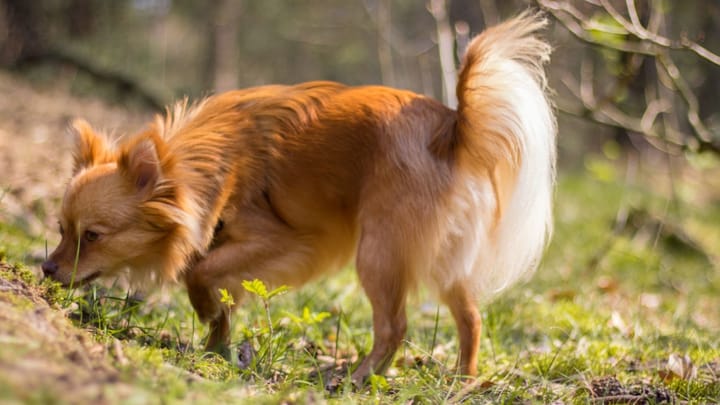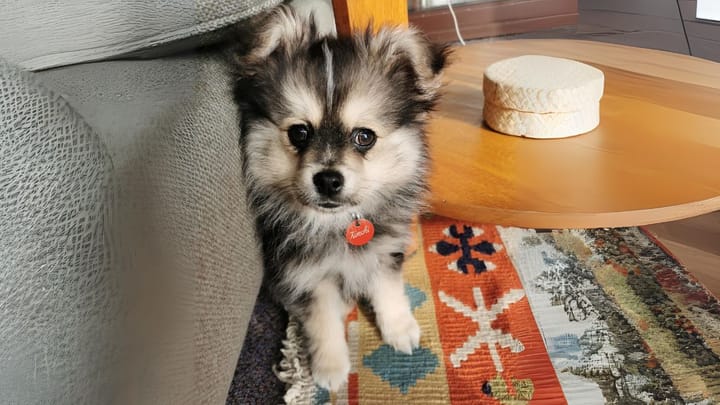Pomchi
Crossbreed: Pomeranian or miniature Spitz × Chihuahua


The Pomchi is a cross between a Pomeranian (Dwarf Spitz) and a Chihuahua. They are intelligent, affectionate, playful and energetic, while remaining alert and barking to warn their owners of any potential danger. Pomchis can be very anxious and they don't like to be left alone for long. As a small dog, they're suitable for apartment living and easy to take with you wherever you go.
There are five different sizes of the German Spitz dog, ranging from the smallest, the Pomeranian, to the largest, the Keeshond. They are all cheerful, jovial and affectionate but reserved around strangers, which makes them good guard dogs. They are intelligent and docile, making them easy to train and suitable for many households, especially those with children.
While the Chihuahua shares its name with the largest state in Mexico, it is considered the smallest dog breed in the world. Intelligent, brave, and affectionate, the Chihuahua makes an ideal companion for many pet adopters, particularly those new to pet ownership. Its adaptability allows it to thrive in a wide range of lifestyles with ease.

Pomeranian or miniature Spitz
There are five different sizes of the German Spitz dog, ranging from the smallest, the Pomeranian, to the largest, the Keeshond. They are all cheerful, jovial and affectionate but reserved around strangers, which makes them good guard dogs. They are intelligent and docile, making them easy to train and suitable for many households, especially those with children.

Chihuahua
While the Chihuahua shares its name with the largest state in Mexico, it is considered the smallest dog breed in the world. Intelligent, brave, and affectionate, the Chihuahua makes an ideal companion for many pet adopters, particularly those new to pet ownership. Its adaptability allows it to thrive in a wide range of lifestyles with ease.
|
Life expectancy |
The Pomchi has a life expectancy of between 12 and 18 years |
|
Temperament |
|
|
Size |
Small
|
|
Adult size |
Female
Between 6 and 9 in
Male
Between 6 and 9 in
|
|
Adult weight |
Female
Between 4 and 11 lb
Male
Between 4 and 11 lb
|
|
Coat colour
|
Black White Brown Sand |
|
Type of coat
|
Short Long |
|
Eye colour
|
Brown
|
|
Purchase price |
The Pomchi costs between £500 and £1200 |
More details about the Pomchi
Pomchi: Origins and history
The first Pomchis appeared in the USA in the 1990s. They are the result of a cross between Pomeranians and Chihuahuas, two very popular small dog breeds in the United States. Pomchis continued to grow in popularity in the 2000s. They have become a highly sought-after crossbreed, particularly in the USA and Canada. They are appreciated for their small size, silky coat and endearing personality.
Pomchi: Characteristics
Pomchi: Behaviour
Training a Pomchi
Thanks to their intelligence, Pomchis are generally easy to train, responding well to positive, consistent training.
Pomchi: Lifestyle
Breed compatibility Pomchi
Pomchi: Purchase price
The price of Pomchis can vary considerably, depending on the breeder. Expect to pay between £300 and £2,000.
Pomchi: Shedding
Average
Pomchis shed moderately.
Pomchi: Grooming
Pomchis need regular grooming to prevent knots from forming.
Pomchi: Health
Although Pomchis are generally considered to be robust dogs thanks to their mixed genetic heritage, they can be prone to certain health conditions specific to the parent breeds. It's important to note that, like all small dogs, they must be handled with care to avoid injury.
Due to their small size and coat, Pomchis can be sensitive to extreme temperatures. It's crucial to monitor their exposure to intense heat to avoid heatstroke.
A Pomchi can tolerate the cold to a certain degree, especially if they have inherited the thicker coat of the Pomeranian. Pomchis may, however, need extra clothing during winter months to keep them warm.
Like many small dogs, Pomchis can become overweight, especially if they don't get enough exercise or if their diet isn't well managed. A balanced diet and regular exercise are essential to maintaining their ideal weight.
Common health problems in Pomchis can include:
- allergies
- skin diseases
- heart problems
- oral problems
- epilepsy
- joint disorders
- eye disorders
- obesity
- hip dysplasia
- hypoglycemia
endocrine disorders
It's important to keep a close eye on your Pomchi's health, and to consult a veterinarian regularly for preventive care and advice on disease prevention. A balanced diet, regular exercise and proper care can help maintain your Pomchi's health and wellbeing.








